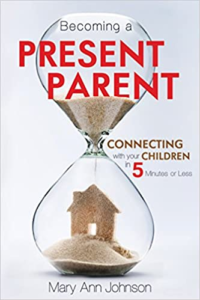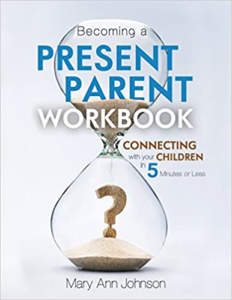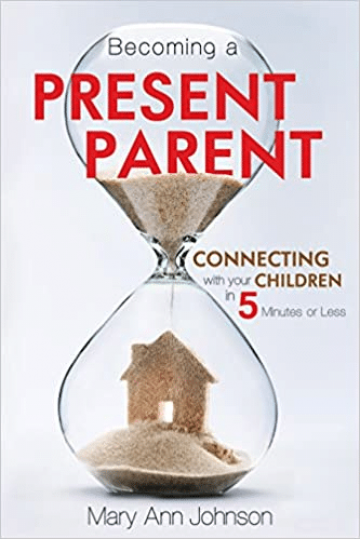A few years ago, at a work conference, I was privileged to attend a seminar on how to maintain self-improvement throughout your career and throughout your life. There were a dozen wonderful recommendations- many of which I was, and am doing, and others that surprised me. One of the things that surprised me was the advice to read self-help books. The reasoning was that though we might feel like we are on track and doing well, there is always room for improvement. (At least for me!) There are always new ideas and trends and applications which help each of us to be more and more successful, so why not keep up with it? Plus, there is some advice that does not work for me, but will work for my husband, or my children. Flexibility in self-improvement is just as imperative as the actual self-improvement.
 So when I first saw Mary Ann Johnson’s Becoming a Present Parent; Connecting with your Children in Five Minutes or Less, I was interested. Interested in improving as a parent. Interested in improving my relationship with my children. And especially interested in the “Five minutes or less” part.
So when I first saw Mary Ann Johnson’s Becoming a Present Parent; Connecting with your Children in Five Minutes or Less, I was interested. Interested in improving as a parent. Interested in improving my relationship with my children. And especially interested in the “Five minutes or less” part.
Though the book is not new, I revisited it (along with so many other books during COVID lockdowns) and was reminded of how important the recommendations are. In just a few days of my re-reading this, my relationships with my children improved and I found myself better in tune to my children as individuals, and not so much as “we’re all in this COVID thing together” soldiers.) Indeed, it was even better the second time around.
Whilst Mary Ann is a member of the church, and her religious background influences her writing, she is without judgement and stays true to her mission in helping you to develop a relationship with your children. In her words:
“I have seared on my mind the struggles we shared as a family of nine—a husband who traveled for a living, drug abuse, premarital sex and a child born out of wedlock, thoughts of suicide, failure in school, smoking, alcoholism, lack of belief in one’s value as a person, quitting school, abandoning church, a mother who raged and yelled, managing feelings of despair, and coming to terms with same-sex attraction…(and through it all)… We’re connected and bonded in amazing ways. We look out for one another. The kids support each other and lean on each other. We’re still a family!”
Perfection? That is for the next life. And I love that attitude! Don’t we need more love and less perfection? I think so. I find this practical theory alone to be revolutionary – rather than vacuuming ourselves out the door so the living room looks just like the celestial room in the temple (all the while the children are locked out of the house, online or fighting and running wild), this book embraces the reality of a imperfect life that can be absolutely extraordinary and filled with love.
Easy to read, and comprised of stories, Mary Ann includes academic references and recommendations in an easy to mimic way that simplifies the complicated relationship we often have with our children. And amongst the ways in which she suggests you can connect with your children, she intermixes recommendations for self-care, so you can be the best person, and the best parent.
This book is a great read for parents who want to connect with their children on a deeper level, and for parents who may be having a difficult time in connecting with children who might not be making the kinds of choices that parents sometimes hope for or expect. If nothing else, it is a great way to fine tune your relationship with your children in this complicated (almost post-) COVID world, so you can leave those “new math” distance learning wars behind.
 Becoming a Present Parent is well with the $2.99 Kindle ($18.99 soft cover) cost, and for those who like to work things out in a supported and trackable way, there is a companion workbook for $12.99. (I used the workbook, it’s super handy)
Becoming a Present Parent is well with the $2.99 Kindle ($18.99 soft cover) cost, and for those who like to work things out in a supported and trackable way, there is a companion workbook for $12.99. (I used the workbook, it’s super handy)




3 Responses
The phrase “same sex attraction” is homophobic. Mothers with LGBTQ kids who are genuine allies will not be purchasing a book that harms their children by disseminating anti-LGBTQ hate speech.
I understand. But the author is LDS and uses typucal lds terminology. I think is book is excellent for TBM parents of gay children in helping the parents to set aside their biases, connect to their children and keep the family intact, rather than abandoning their child because they can’t fathom having a gay child. In other words, the author does not put the administrative church before their child, and reaches those who might otherwise choose to do so. It is a brilliant, empathetic, bridge for all.
Sounds like an interesting and helpful read, thanks for the recommendation.